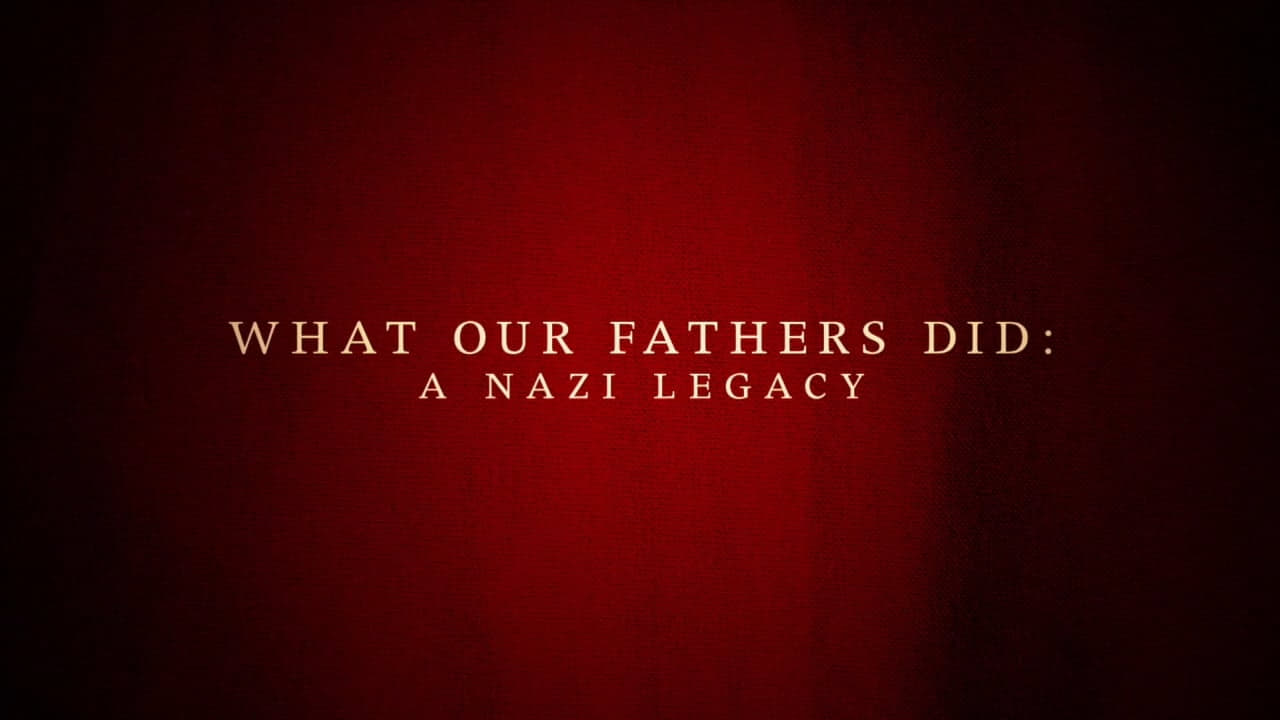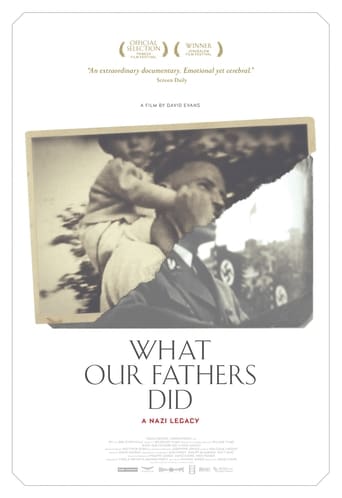



Dreadfully Boring
A lot of fun.
The film's masterful storytelling did its job. The message was clear. No need to overdo.
View Morewhat a terribly boring film. I'm sorry but this is absolutely not deserving of best picture and will be forgotten quickly. Entertaining and engaging cinema? No. Nothing performances with flat faces and mistaking silence for subtlety.
View MoreWhile a few reviews across the internet have said this is not a good documentary because of the bullying of the one elderly man, I beg to differ. This documentary is about showing how two elderly men who had fathers in power that were nazis. One elderly man is fine accepting that his father was horrible. The other elderly man refuses to accept his father was horrible. Its meant to show us how strong people can be about their views on both sides, especially when confronted with the truth. The one man that that kept defending his father is the one some people support because, as the man says, his father did not kill anyone. He did not fire a gun. He did not do anything. He was simply the "ruler" and had to follow orders or else he would be killed. If anything this man tells us his father tried to help the Jews. Despite having no evidence of that really. Even when shown documents that his father gave orders and paid the people under him to kill jews, he still denied that his father was to blame. And in reality that is not how things work. If I hire someome to kill someone else, I may not do the killing. But I am responsible since I hired someone to kill someone else. The elderly man doesn't realize the point the other elderly man (and the third man) was trying to make was that his father would have been a truly good man if he refused the orders and let himself be killed. But because he didn't want to die, he instead did what he was told and thus passed on the orders too. Which made him part of the killing of the Jews. A TINY part of you can almost understand why he defends his father. Its his father, despite not knowing him really as a child, you don't want to live in shame of knowing your father was bad. However, most of you realizes its just how things are. You have to accept your father did what he did. You as his child do not have to live with that guilt because you were a child at the time. Your father my have been a horrible person, but you are your own person and have your own legacy.Which is why the other elderly man was someone I agreed with on everything. He didn't have any pride in being his fathers son. He didn't make excuses for his father. He accepted his father was a bad man, a nazi. And while the documentary doesn't really end on any sort of resolution, it does however leave you thinking about how people think in these situations. And it also makes you realize just how much nazism is still out there today. You see a event going on at which the elderly man (in denial) seems to almost enjoy where people are dressed up in nazi gear. Even with kids with shaved heads are at it. It is scary to think these sort of people still exist and are teaching their kids such things. You almost feel as if the eldery man is not really in denial, buy maybe a nazi sympathizer. Which he could very well be.
View MoreThis documentary follows two different men who were sons of prominent figures during WW2. The person who does the interviews had several relatives who died in the war. This leads to an obvious bias on the part of the interviewer, but nonetheless it manages to reveal a sense of complication - both mental and emotional - created by such extreme events of the past. If your mind and heart are open, you will get much more out of this documentary.Some people say this has a political message / bias to it. But to me, the fact that real people were asked to encounter questions the enormity of which the world has never seen, and hopefully will never see again, negates any sense of intentionality of a "take away" message. In the end, it's left up to the viewer to decide - and that may be the most difficult part, realizing that a "decision" in terms of right and wrong are not always as clear as they seem. Not when it's personal. Not when it's your own father who was involved in such atrocities as this.
View MoreManipulative, simplistic documentary which adds to the pantheon of works positing the acceptability of but a narrow view of Nazism. The film opens with international lawyer Philippe Sands seemingly astonished to learn that Niklas Frank, son of Hans Frank, Governor- General of occupied Poland, is interested in discussing the architecture and furnishings of an Austrian castle. Philippe's confusion deepens when Niklas produces photo albums showing smiling family members and childhood birthday pictures along with photos of Adolph Hitler. Can Philippe's surprise be genuine? Is it so unimaginable that a family album might include pictures of a man the father worked with? Happily for Philippe, Niklas insists he had little love from his parents. We learn that his mother was remote and narcissistic - Niklas refers to her several times as Queen of Poland - and his parents' marriage was unhappy, with his father trying to get a divorce. Niklas is presented as fairly single-minded throughout the film, relentlessly condemning his father along with swipes at his mother. Philippe, and the BBC viewer, can relax. They were nasty people, these Nazis.Unfortunately for Philippe and Niklas, Horst von Wächter, son of Baron Otto Gustav von Wächter, apparently loves his father, and has only fond memories of both his parents. His father was a good man, we are told. He loved his wife and his children, and while he was an SS Gruppenführer and Governor of Kraków under Hans Frank, von Wächter never whole-heartedly supported the Final Solution. Horst maintains throughout the film that his father never once signed an order to transport Jews to death camps, and in fact suggests that he remained in his position from noble motivations, especially to support Ukrainian independence. Niklas and Philippe are exasperated with Horst, and the dynamic of the film is set.For the remaining hour and a quarter we see Philippe and Niklas, supported by a studio audience in London, struggle to convince Horst that his father was culpable in genocide. The battle becomes personal when Philippe reveals that under Frank and von Wächter 79 of 80 Sands family members died in Lviv, Ukraine. Philippe and Niklas argue with Horst in various venues, from an administration building where Frank delivered orders, to the site of mass executions, to a present day Ukrainian commemoration of the sacrifice of Ukrainians who fell fighting for independence. Philippe's alternately legalistic and quasi-therapeutic berating of Horst becomes a conspiratorial discussion with Niklas of whether Horst "is a Nazi" and what it will take for Niklas to sever his relationship with Horst.Horst a number of times attempts to communicate a context for how he sees his father's actions, but Philippe irritatedly rejects that there might legitimately be any context other than that of the BBC television audience. Horst references the First World War and the number of Austrian dead on the eastern front. A Ukrainian asked about the presence of modern day fascists replies that the question is complex, but this goes unexamined.The film closes with a rather excruciating imagining by Niklas Frank of his father's dishonest plea for absolution before his execution. For Niklas and Philippe, Niklas and Horst's fathers were beyond understanding and without redemption. Nazi crimes took place in a past disconnected from the time before Niklas's birth and events after Hans Frank's capture.In the end What Our Fathers Did is a self-satisfied voyeuristic pummeling of one old man by two other old men in the name of a justice which recognizes complicity in Nazi murder as more evil than acquiescence and complicity in other mass murder.
View MoreThis documentary focuses on Niklas Frank and Horst von Wachter, both born in 1939, and both being the sons of high ranking officers in the Nazi regime, who were directly involved in the mass murders of Jews, and other citizens, during WWII. However today, Niklas and Horst are near polar opposites in how they view their fathers. Niklas abhors and detests everything about his father Hans and what the Nazis did, and how, although he was only a young child during that period, his father's actions have haunted and plagued him his entire life.On the other hand, Horst, at least in the film, shows no real emotion for those persons that were exterminated, but states that his father Otto was of good character who protested what was happening, and was only part of the Nazi system carrying out his duties.One of the filmmakers Philippe Sands, an international lawyer specializing in genocide, is also a major participant in the movie. He is the chief interviewer of the two men, and also serves as narrator. We learn he's also directly linked to the story, as his grandfather was the only survivor of his 80 relatives that were killed by the Grossaktion in the Ukraine in 1942, where 3500 Jewish citizens of that area were exterminated. This was an area that was run by Otto von Wachter, under the command of Hans Frank.There are a number of things in this documentary that I found very chilling and disturbing. To mention just a couple, one was how Niklas recalls his father coming home from another day of mass murder, and acting like a "normal" dad at home. Another was some of the Ukranians, during the 2014 uprising and civil strife, welcoming Horst, while wearing a type of Nazi paraphernalia, and telling him what a good man his father was, with seemingly no regard for those that were exterminated there.Overall, I thought this was a well presented documentary, with fascinating film clips of the Nuremberg Trials and the prison there. I thought this movie presented a different angle to the infamous Nazi history as well, with the focus on two sons of Nazi officers and how they felt today some 70 years later about their fathers.
View More